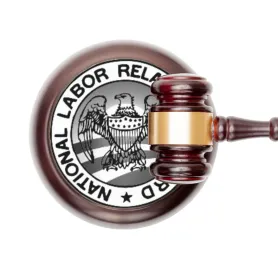In a pending NLRB case, an employees’ rights advocacy group, the National Right to Work Legal Defense Foundation (“NRTW”), filed an amicus brief supporting poultry plant workers seeking to decertify their union, the United Food and Commercial Workers Union (“UFCW”), even though there was a collective bargaining agreement in place between the UFCW and their employer. The facts of the case are complex. But, the issue presented in the amicus brief and reply from the union is simple: should the NLRB abolish the decades-old contract bar rule that prohibits an election to oust a union with a collective bargaining agreement in effect?
The contract bar doctrine is the rule that once a collective bargaining agreement is executed, no representative elections are permitted for that bargaining unit for up to three years. This includes barring rival union petitions during that period as well. Generally, the rule is meant to promote labor peace by providing stability in the bargaining unit representation for the duration of the collective bargaining agreement (up to three years).
The NLRB has asked for public amicus input on whether it should rescind the contract bar doctrine, retain it as it currently exists, or retain the doctrine with modifications. The deadline for filing amicus briefs was September 8, 2020.
NRTW favors abolishing the contract bar doctrine altogether. It argues that the doctrine improperly impinges on employees’ rights to choose their bargaining representative by protecting an unwanted union for up to three years during the term of a collective bargaining agreement. Union supporters argue that the contract bar is important labor law doctrine that maintains stability in collective bargaining relationships.
The NLRB’s public input period concludes next week. Will the Republican-majority board abolish the contract bar doctrine? Modify it? Or leave it as is? Employers should pay attention to what each of these outcomes could mean for them:
-
Status Quo. If the NLRB declines to change the contract bar doctrine, employers can proceed business as usual. The doctrine will continue to prohibit elections during the duration of a collective bargaining agreement, except under a few defined exceptions.
-
Modification. If the NLRB reforms the contract bar doctrine, employers will need to stay abreast of the evolving law. Employers will need to identify which agreements bar elections and which don’t, under the new rule.
-
Abolition. If the NLRB abolishes the contract bar doctrine, employees will have the ability to seek decertification whenever they’d like. This may benefit employers, as bargaining unit employees may seek to oust a difficult-to-work-with union. Conversely, the frequent changes in bargaining representatives will create challenges in building a relationship with the representative and negotiating an agreement.
Both employers and unions should pay close attention to the NLRB’s decision on this important doctrine in the coming months and consult with experienced labor law practitioners to determine how any changes may affect the labor law landscape going forward.





 />i
/>i
